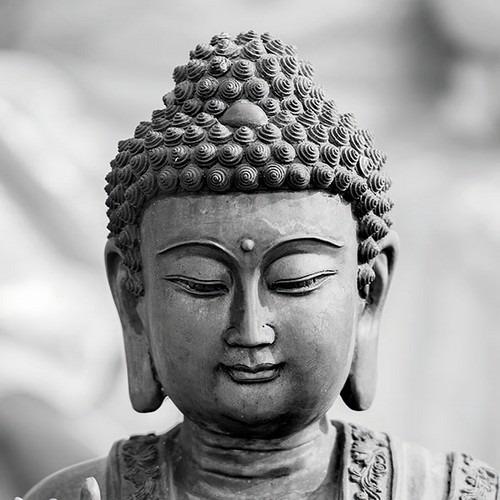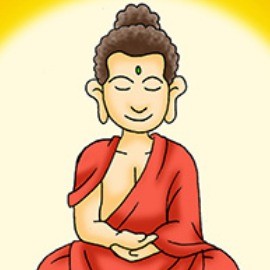Loving kindness

By anonymous
Good will is the best medicine to cure the disease of anger and hatred. The medicine of good will is found in the Buddhist term "metta", which has its root in the word for friend. This concept has much in common with the Confucian term "Jen" or human heartedness. Both terms describe a relationship to others that is predicated upon a feeling of genuine sympathy and warmth for an individual, not based on our relationship to him, but through an understanding of the human condition. We cannot rely on spontaneous warmth and love to arise whenever we deal with another human being, as these emotions are too infrequent. This is due to the overlay of conflicting conditioning in the ego.
We have to retrain our mind to do away with aggressive and fearful thinking by meditating on loving kindness. This has to start with a loving acceptance of the reality of ourselves. This does not mean an indulgence in self pity or narcissism. What is required is an analysis of our own person from the point of reference of a third person, viewing the two realities of our conscious and unconscious. The best way to approach this is to look at ourselves with a parental mind; what is called in Japanese "Roshin". A good parent has a sense of compassion for his or her child that does not preclude stern discipline. A person needs to wish themselves spiritual happiness in a genuine spirit of acceptance. Once we begin to feel a love for ourselves based on an understanding of our own nature, much of the anger and hostility that we direct toward others disappears.
This practice then becomes directed outward toward others, starting with someone emotionally close, and eventually expanding to include total strangers. This endeavor is not any different from any other practice. The more you do it, the better you become at doing it. If one practices being neurotic, they become very neurotic and if they practice kindness, they become very kind. Every kind of attitude carries with it its own natural thermodynamic. Kindness produces a response of appreciation, love and well being that reinforces the effort. Our motivation remains free of influence for a desired result while our unconscious records the uniformity of view with will. When this happens, the view of spiritual reality is further verified by concomitant rewards that were not even sought out in the action.
The practice of meditation on loving kindness is effective when we are able to share in the other person's own subjective condition. This is the point where other begins to dissolve in to self. We usually have a simple sense of common being with one group or another. It starts with family identity and then proceeds to take in friends, neighbors, countrymen and so on. The identity process itself is an inclusive identity process.
Inclusive identity shares an understanding of the emotional and subjective common experience of the group and produces a familial warmth in relations. Inclusive identity does not require others as a background upon which it makes definitions of inclusion. It defines those included, simply by an understanding of common nature without regard to any judgments toward others outside the included group.
Exclusive identity on the other hand is based solely on the differentiation of one group from another. It always comes down to a them and us scenario. By nature, this type of identity process is an extension of the ego, rather than an expression of compassion as is inclusive identity. Exclusive identity is an expression of ill will which right intentions aim to cure.
The next step in developing right intentions is to generate a state of abiding compassion for others. After a person has been able to realize the essential nature of fellow beings as part of himself, and infused that understanding with love, he develops an active compassion. Compassion is the correlate energy of wisdom; compassion is the manifestation of wisdom in action. Compassion carries kindness into action by assuming a stance of harmlessness toward other creatures.
Kindness witnesses love for others but it does not coerce us to initiate action to alleviate their suffering, while compassion does. Compassion is developed by contemplating the suffering of others and recognizing the commonalty of that suffering with our own being. This goes beyond merely identifying with others passively and wishing them well, by actively feeling their suffering ourselves. When this occurs, we are energized by compassion to do whatever is necessary to aid them.
The action which is most consistent with compassion is harmlessness. We cannot actively aid every being we come in contact with, but we can make sure that our actions do not increase their sufferings by harming them. This then becomes the first step in compassion; becoming harmless. To be harmless, it is also necessary to be fearless since there are many occasions when deluded persons will strike out at us. Fear and anger are two side of the same coin. Anger is not present unless the self feels threatened, and a threat arouses anger. This is a very difficult part of practice where most students have a tendency to give up. The dharma warrior has to be fearless in order to be perfectly harmless.
Every time we face fear and do not give in to it, we will grow a little stronger. Allowing people to be hostile and not responding to them in kind, gives one a strange sense of power and freedom. This is because, for the first time, we are not giving in to the ego, which tells us that others are something to fear, and have power over us. At this point, we begin to understand how we have bought into this sense of powerlessness and allowed our entire lives to be conditioned by it.
When we experience this new sense of freedom from, and power over, our fear of other people's opinion of us, it generates more compassion for them. This is curious because on the surface it would seem that a sense of power, combined with freedom from concern, could produce a wanton disregard for other people. If this had not occurred as a result of our spiritual efforts of right intentions grounded in loving kindness and mutual identity, then this transformation of attitude would be dangerous.
However, our new attitude toward others is based on a loving acceptance of them. We recognize each person as someone who shares with us a common spiritual identity and a commonalty of suffering as part of their human condition. This understanding is too potent to allow us to ignore it by falling into the delusion that others are a threat to us, and therefore require a defensive position on our part. When we are injured by others, we do not wish to retaliate because we feel sorry for those who are so disturbed that they would attack someone who wishes them only happiness.
All this does not mean that we degenerate into a kind of idiot compassion that allows others to do destructive things when we have the power to stop them. It simply means that whatever action we take towards others is driven by compassion. Now it may very well be that compassionate action can be extremely severe. For instance, if a madman were to walk into a hospital with a gun and start shooting people and the only way he could be stopped was by killing hem, then that would be compassionate action. Even such extreme action would be done without anger or regret.
Buddha stated that whatever one consistently reflects upon becomes the natural inclination of the mind. This is something that is easy to understand, yet there is one area of our lives where we fail to take notice, and that is the way we entertain ourselves. The average dharma student in the west works hard at his or her practice and attempts to follow the precepts as best they can. In spite of this, many of them are repeatedly overcome by the passions and delusions that have plagued them all through their practice.
The problem doesn't seem to be their intentions, but how insidious some of the sensory input, that comes to them from living in this society, can be. We are constantly bombarded with stimuli whose sole purpose is either selling us goods or appealing to our basest instincts. The media, specifically commercial television and films, offers a steady diet of world view so poisonous that for a dharma student to watch much of it would be tantamount to him committing spiritual suicide.
The violent destruction of human life is the primary agent of entertainment of this poison, with secondary doses of glorification of wealth, power, and denigration of women and some men as sex objects. It is pitifully lacking in moral judgment, aesthetic taste, and anything that would exhibit spiritual values.
Even those aspects of culture that have been traditionally healthy outlets for recreation and entertainment such as athletics, have been soiled by the dirty hands of Hollywood, Madison Avenue, and the television industry.
The average American child watches hundreds of hours of this excreta each month, becoming totally inundated in this inane, salacious, superficial view of the world. Most adults today have also been exposed to countless hours of this drivel which is stored up in their memory like some latent virus, ready to erupt.
Pathetically infantile individuals in sport and entertainment, who ridicule opponents and denigrate common decency, are held up to be heroes. The influence of this negative programming on our unconscious and its effect on spiritual practice can not be underestimated. For a student to make progress in the eight fold path, it is absolutely necessary that they carefully police their own leisure time to ensure that the influences they expose themselves to are consistent with their right resolution and right view.
One has to remember that for the eight fold path to be effective, there has to exist a harmony of influence between all of its respective elements. This is a consistent view in all of Buddhist teachings, that spiritual life mirror the natural order. There is no separation of creator and creation that requires a leap out of the system for salvation to occur. Salvation must occur as a result of the system itself, and therefore be an inherent part of nature. For the Buddhist, enlightenment is salvation and the enlightened mind we call Buddha nature, is the ground of reality.
This organic world view requires an absolute consistency of effort on the part of the practitioner to be successful. This is why it is of paramount importance for the dharma student not to negate his or her efforts by allowing the insidious effects of the entertainment media's world view to invade their own.


















